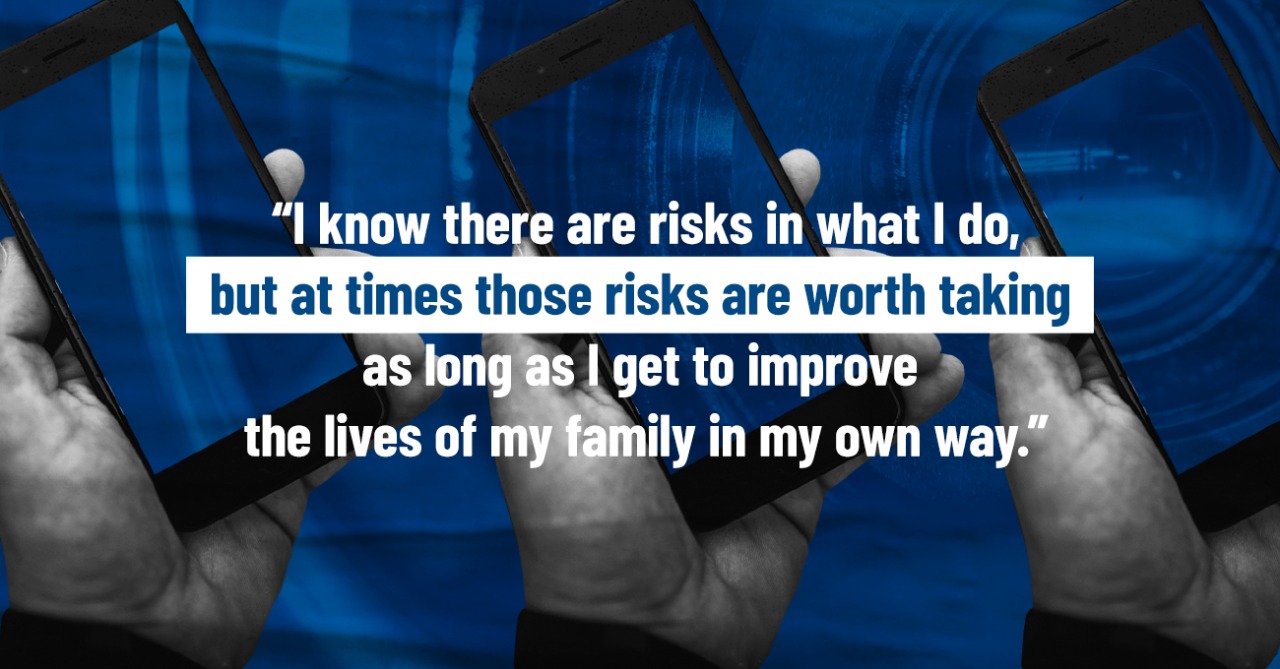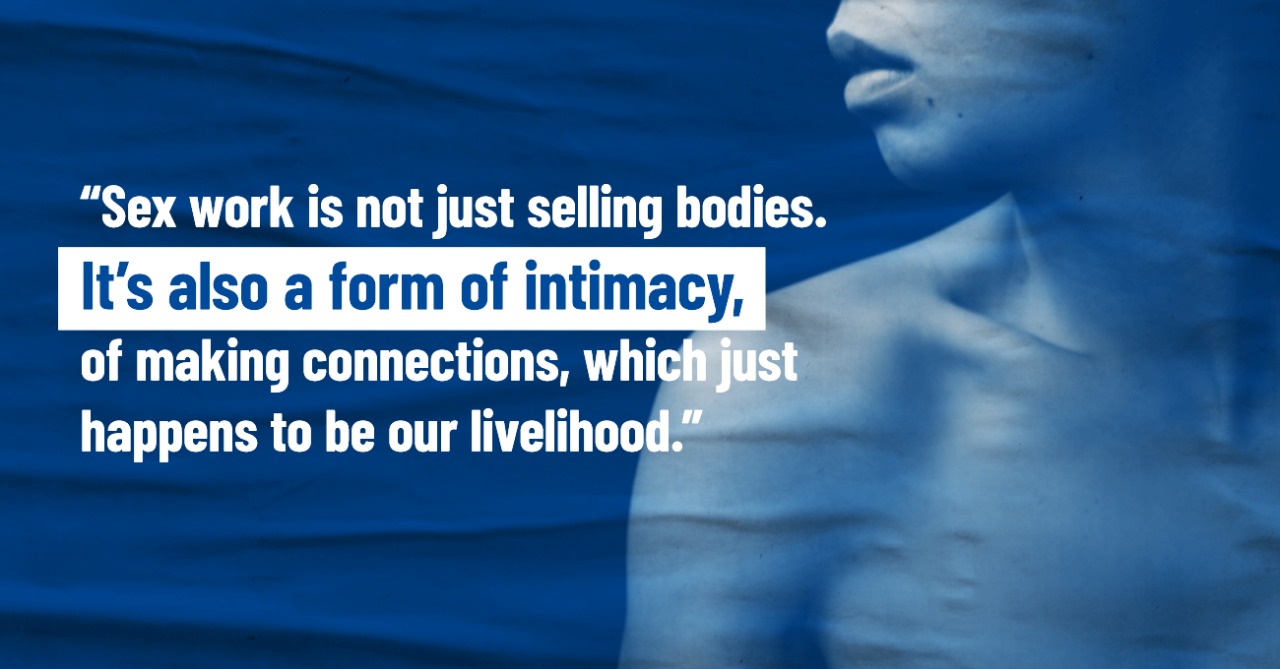Of hustlers and divas: Monetizing bodies, going online for adult performances
(Second of two parts)
(Note: Names of sex workers interviewed for this article are pseudonyms or internet personae.)
MANILA, Philippines—Some online sex performers, or sexual content creators, are unaware of the politics behind what they do. They see it only as another hobby, or form of service, or a way of hustling.
These are not those people.
Politically and socially aware, these individuals are creatives who have found their own way of normalizing the notoriously hushed issue of sex work in the country. In the process, they also contribute to the larger sex-positive movement.
Article continues after this advertisementREAD: Of victims and saviors: Sex work amid the pandemic
Article continues after this advertisementThe boy next door
On the surface, CJ seems like your average 21-year-old guy. He loves to sing, watch movies, and hang out with friends. He dreams of becoming a recording artist or an indie actor — to be in the entertainment industry.
He has been his family’s breadwinner since he was 18, when he was forced to stop his college studies, and work as a clerk and then as customer service associate.
“Sometimes I think to myself that, at my age, it’s unfair to already be my family’s breadwinner,” he told INQUIRER.net in an e-mail interview. “But I have no choice.”
As it happens, CJ also makes gay pornographic content — solo acts and collaborations. What began as an online exploration of his sexuality — a video where he pleasures himself — eventually led to more daring sex acts.
After the video went viral, he received messages from alter people asking to collaborate with him. He learned insider tips on how much to charge for escort work and how to earn from it. A netizen offered help in managing and making money out of his content.
(Alter refers to anonymous social media users who post, share, or trade sexually explicit content.)
From two accounts alone, CJ earns an estimate of 700 to 800 US dollars per month, sometimes reaching 1,000. Together with money from his private social media accounts where he also sells sexual content, he is able to support his family and start a small business.
His family discovered his activities when someone sent them one of his videos. “Of course they got mad, but although it was difficult, I explained the situation to them. They’ve learned to accept what I do as long as I don’t harm anyone,” he said.
Prone to online attacks for what he does, he has been called “disgusting” and “slut” among other things. Still, he insists that he does not have regrets.
“I know there are risks in what I do,” he admitted, “but at times those risks are worth taking as long as I get to improve the lives of my family in my own way.”
CJ does not plan to be in this line of work for long. In fact, he recently took a break due to personal reasons. But old habits die hard. Because of the recession, which cost his parents and siblings their jobs, he decided to make a comeback.
In the near future, CJ hopes to quit sex work, continue his studies once his family becomes financially stable, and grow his business. “Maybe I’ll finally get to audition to be an indie actor,” he said.
#Hustle
If diva is a female version of a hustler, then Sha Ainah is by all means a diva. A true-blue businesswoman, she is a proud transwoman who owns a cosmetics company that was doing well before the pandemic hit.
“Ever since the pandemic, my business started to decline because there were no more bazaars and resellers,” she told INQUIRER.net in a phone interview. “I’m doing it online but it’s not the same as doing it in person.”
A self-confessed thirst-trapper, she habitually posts sexy photos of herself on Instagram. One day, a friend introduced to her to the idea of monetizing these photos, which was easy because she already had thousands of followers.
She saw this as another business opportunity, and as with any other business, she did the work. She conducted research, observed the field, formed relationships with other models online, then built her own global fanbase.
Sha Ainah describes herself as a digital creator. “But if there’s a chance to accept an indecent proposal, why not?” she said. “You got to work smart.”
During her first four months of online sex work, she already earned 30,000 US dollars. Now, she makes around 3,000 US dollars per month.
Atop her list of unexpected experiences was meeting a business tycoon from Singapore. The man messaged her, subscribed to her online site, “tipped” her photos, then sent her money directly.
“I Googled his name one day and found out that he’s actually a billionaire business tycoon based in Singapore,” she said. “He told me that when the borders open [after the lockdown], we’ll find a way and see each other.”
When she did online sex work, she felt as if she already “sold [her] soul to the devil.” But with the money she earns from it, together with sales from her company, she continues to pay her bills and send her sister to college.
The life of someone like Sha Ainah may appear glossy on the surface, but behind that cool facade is a carefully thought-out mechanism that requires research, diligence, and of course, chutzpah.
“It’s expensive to be beautiful, so why not make money off of it?” she said, adding that she buys a new outfit every week because subscribers want variety. “You get more money, but you get more needs as well.”
Your body, your choice
Sha Ainah does not see anything wrong with individuals who monetize their bodies online, and she believes they are not being coerced. “Your body, your choice,” she said.
“Probably some are forced to do it because they need the money. But then again, they have options,” she said. “They choose it because they know they can make easier money on those platforms.”
Sha Ainah, CJ, and Delilah all said that what they do online has boosted their self-confidence in one way or another. They have learned to embrace their bodies through affirmation from their clients and subscribers — something intangible made perceptible by money.
Rica Cruz said that in the country, there is a bubble consisting mostly of scholars, city dwellers, and college-educated individuals who embrace sex positivity. But during her tour at different schools and universities, where she held talks prior to the pandemic, she concluded that the Philippines is still not a sex-positive nation.
“Outside that bubble, we want it to be sex-positive, but sex education is so lacking in the country, if not at all non-existent,” she said.
Sharmila Parmanand agreed that the Philippines is yet to become sex-positive. “Our public front is very conservative,” she said, “but behind closed doors, a lot of these conservative values are being transgressed.”
With this insistence on maintaining an orthodox facade and keeping “immoral” activities in the dark, she said she believes the exponential growth of individuals who engage in sex work online will not necessarily translate to louder public support for its decriminalization.
Further, Parmanand said there is tolerance for certain groups of people—a “respect [for their] hustle”—but not others, and “who is able to transgress is very classed, contingent on a class hierarchy or ‘whore-archy.’”
She shared a cri de coeur, or cry from the heart, from a sex worker she interviewed: You all love it when a celebrity is being pimped to a politician, which we all know happens. You love watching them on TV. But when I’m the one doing it, it’s wrong. Why? Is it because I’m poor? Is it because I don’t pretend?
Decriminalize, not legalize
The Philippine Commission on Women (PCW) supports the decriminalization — but not legalization — of sex work. A statement on its website says: “We are advocating for the decriminalization of prostituted persons so that they will no longer be arrested, treated and fined like criminals, but we are not in favor of legalizing prostitution.”
PCW sees prostitution as “a form of sexual exploitation…that commodifies and dehumanizes women, men and children who are being victimized within the system.”
It views all sex workers as victims and wants criminal liability solely for clients, pimps, and establishments involved in prostitution. Further, it calls for the amendment of Articles 202 and 341 of the Revised Penal Code, both of which penalize sex workers.
“Programs that provide restitution and renewal for an alternative lifestyle and livelihood for the prostituted person should be put in place instead of punishing and treating them as criminals, which lead to further discrimination and abuse,” the PCW says.
However, advocates like Parmanand and Delilah view this move as “fake decriminalization.” Aside from rejecting the PCW’s belief that all sex workers are victims, they said that targeting the demand side cripples the business of sex workers, thereby making their situation worse.
Parmanand, Delilah, and Cruz do not see sex work being decriminalized in the Philippines during their lifetime. But they remain optimistic.
Through her advocacy work, Cruz said she hopes that the Filipino youth will eventually be more open to discussing safe and responsible sex. “I hope they understand that they can talk about sex without the shame and the stigma,” she said, “and to not look at it as something bad or dirty.”
Sex positivity, stressed Cruz, is the way to decriminalizing sex work. She hopes those in power will be educated on the benefits of decriminalization and contrast these with the disadvantages. “It all starts with comprehensive, age-appropriate sex education,” she said.
Parmanand said she believes the shift to online will bring new challenges to the movement to decriminalize sex work, citing problems in mutual aid, outreach programs, and grant proposals, among other things.
She also said she believes this setup will further establish the hierarchy in sex work, where technically savvy individuals who can adapt online will remain at the top while establishment- and street-based workers continue to struggle at the bottom.
A united front
Parmanand and Delilah spoke of progressive, feminist collectives sprouting online, such as Maya: The Feminist Collective and the Lunas Collective, that also work to subvert assumptions about sex work and signaling a coming change led by the younger generation.
However, some progressive movements still distance themselves from the conversation on sex work, specifically the campaign for its decriminalization.
Referring to the Sexual Orientation, Gender Identity and Expression movement, Delilah said: “A lot of [sex workers] are part of the LGBTQ+ community, but even in that movement, there is still this anti-sex work sentiment.”
Parmanand made the same observation in her article, saying that some LGBTQ+ organizations refuse to associate with sex workers because it is “too politically costly.”
Cruz said she understands that the LGBT community has its reasons, especially since it has been marginalized for so long and is only now starting to be heard.
“However, in the end, everyone is in this together,” she said. “It’s still so far to see that united front because each one is fighting their own fight. And that’s okay, as long as we’re moving forward and no one is stepping on another.”
Diane, who believes people are now more open to discussing sex work, said the Voice for Sexual Rights is applying for proposals related to decriminalization, and hopes the organization will eventually be registered in the Philippine Securities and Exchange Commission.
Jackie, who insists that all they want is to take control of their livelihood, said she believes it is legalization that will lead to a change in people’s perception of sex workers.
“Sex work is not just selling bodies,” she told INQUIRER.net in a phone interview. “It’s also a form of intimacy, of making connections, which just happens to be our livelihood.”
“I think in the next five or ten years there will be a stronger push for [decriminalization],” Parmanand said. “I am optimistic that the conversation will start to happen.”
TSB
For more news about the novel coronavirus click here.
What you need to know about Coronavirus.
For more information on COVID-19, call the DOH Hotline: (02) 86517800 local 1149/1150.
The Inquirer Foundation supports our healthcare frontliners and is still accepting cash donations to be deposited at Banco de Oro (BDO) current account #007960018860 or donate through PayMaya using this link.


